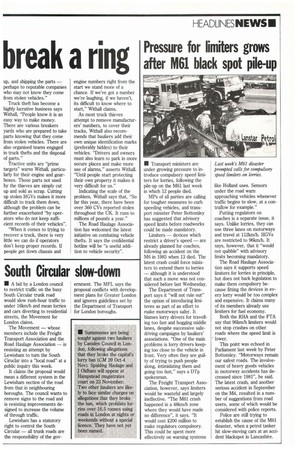Pressure for limiters grows after M61 black spot pile-up
Page 7

If you've noticed an error in this article please click here to report it so we can fix it.
• Transport ministers are under growing pressure to introduce compulsory speed limiters for lorries, following the pile-up on the M61 last week in which 12 people died.
MPs of all parties are calling for tougher measures to curb speeding vehicles, and transport minister Peter Bottomley has suggested that advisory speed limits before roadworks could be made mandatory.
Limiters — devices which restrict a driver's speed — are already planned for coaches, following an accident on the M6 in 1985 when 13 died. The latest crash could force ministers to extend them to lorries — although it is understood that such a move was not considered before last Wednesday.
The Department of Transport says it "will not rule out" the option of introducing limiteres as part of an effort to make motorways safer. It blames lorry drivers for travelling too fast and hogging middle lanes, despite successive safedriving campaigns by hauliers' associations. "One of the main problems is lorry drivers keeping too close to the vehicle in front. Very often they are guilty of trying to push people along, intimidating them and going too fast," says a DTp spokesman.
The Freight Transport Association, however, says limiters would be wasteful and largely ineffective. "The M61 crash happened in a 48kmfh zone where they would have made no difference", it says. "It would cost 2200 million to make regulators compulsory. This could be spent more effectively on warning systems like Holland uses. Sensors under the road warn approaching vehicles whenever traffic begins to slow, at a contraflow for example."
Putting regulators on coaches is a separate issue, it says. Unlike lorries, they can use three lanes on motorways and travel at 112km/h. HGVs are restricted to 96kmih. It says, however, that it "would not quibble" with advisory limits becoming mandatory.
The Road Haulage Association says it supports speed limiters for lorries in principle, but does not back legislation to make them compulsory because fitting the devices in every lorry would be too complex and expensive. It claims many of its members already use limiters for fuel economy.
Both the RHA and the FTA say that 961cm/h limiters would not stop crashes on other roads where the speed limit is lower.
This point was echoed in Parliament last week by Peter Bottomley. "Motorways remain our safest roads. The involvement of heavy goods vehicles in motorway accidents has decreased since 1981", he said. The latest crash, and another serious accident in September on the M4, resulted in a number of suggestions from road users, some of which would be considered with police reports.
Police are still trying to establish the cause of the M61 disaster, when a petrol tanker hit slow-moving cars at an accident blackspot in Lancashire.








































































































